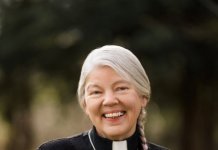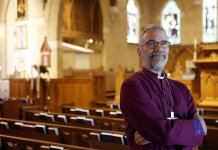The Archbishop of Wales called for the Russian Orthodox Church to condemn the war in Ukraine in a keynote speech delivered to the church’s Governing Body at the start of its synod on 27 April 2022.
Archbishop Andrew John said Russia’s unprovoked attack was “deplorable” and backed calls for the Russian church to condemn the killing of civilians, press for an immediate ceasefire and demand an end to the war.
Addressing members of the Church’s Governing Body at the start of its two-day meeting today, Archbishop Andrew said, “When the church does not practice peace-making, when it does not defend the poor, when it fails to speak out against injustice, it has no right to say anything about the gospel of our Lord Jesus Christ. It forfeits that privilege and departs from its calling. We need to hear this message ourselves as well as say it to sisters and brothers elsewhere.”
The full text of the archbishop’s address:
Presidential Address
In what is otherwise a serious and at times sombre read, Yuval Noah Harari in his book ‘Sapiens’ tells a witty story about the time Neil Armstrong and Buzz Aldin prepared for their attempt to land on the moon. Their training took them to one of the desert regions home to native Americans. One day they came across a wise and elderly tribal leader who wanted to know what they were doing there. They told him they were training to go to the moon. The leader was silent for a few moments and then asked if they would do him a favour: ‘The people of my tribe believe holy spirits live there. Will you take them an important message? ‘Of course,’ their reply, ‘what’s the message?’ The leader asked them to repeat the message in the local language until they remembered it. Understandably they wanted to know what it meant but the leader refused. ‘Only the people of my tribe and the moon spirits can know’ he said.
Late in their training they shared the story and the words they were due to give to the Moon Spirits with a local who spoke this language. The local laughed hilariously. The words translated were: ‘Don’t believe a single word these people are telling you. They have come to steal your lands’.
Enduring judgements are made not on the basis of what is said but on what is done. Actions speak louder than words. And this just as true for the church as for any other organisation. Authenticity is recognized when there is harmony between acts and words, the former authenticating the latter.
We meet in challenging times. The unprovoked attack on the sovereignty of another country is deplorable and the cost and misery this is bringing to millions, without excuse. I wish to echo the words of the former Archbishop of Canterbury (and of Wales) in calling on the Russian Orthodox church to condemn the killing of civilians, to press for an immediate ceasefire and to demand the war is ended. When the church does not practice peace-making, when it does not defend the poor, when it fails to speak out against injustice, it has no right to say anything about the gospel of our Lord Jesus Christ. It forfeits that privilege and departs from its calling. We need to hear this message ourselves as well as say it to sisters and brothers elsewhere.
Closer to home, many speak of a post pandemic environment. It is true that we have seen the ending of many restrictions; we do not yet see an absence of infections. And for those who lost loved ones, talk of ‘post pandemic’ can be heard as an invitation to a commence a journey onwards for which they are not yet ready. They have yet to come to terms with their losses. Quite what the corporate and national effect of the pandemic will be is not yet clear. Like many, I have reflected on what we have learned as a church as a result of the pandemic and one of them is that faith matters – matters a great deal. In the context of huge uncertainty, many found their faith in Christ to be a constant source of support and joy. And when buildings could be both opened and accessed, it has been interesting to see the numbers registering their presence and often writing prayers. The genius of the Anglican way is that we operate with porosity and allow many to come and taste and see.
I think we also discovered that belonging was valuable and whilst we had sometimes thought of ourselves as a huge ship on the oceans (stable but not manoeuvrable), we discovered we were lighter on our feet than we had supposed. Online services become the norm very quickly. What was most significant was the number who shared. Why? Because belonging matters and our fellowship as Christians is deeply important. I also believe we saw examples of a church rediscovering our voice. The church was not the only body to respond with loving service. But we were there too – caring, conducting life-event services in sometimes very restricted circumstances, offering our buildings for use as vaccination centres, helping government in writing guidance for faith communities. When we demonstrate, in practical ways, our love for the world, we show the love of God for all creation.
I think we should take genuine pleasure and joy in the way we responded. We did not walk from the challenges, we moved towards them, embraced them and responded. And today, I want to talk with the Governing Body about another set of challenges we face. The world is changing – our relationship with technology evolves with increasing rapidity; the very nature of work is in flux; the challenges brought about by climate change are only soluble by concerted global action; the geopolitical ecology is changing at a rate not seen for decades. And, perhaps, we have not fully recognized the strength and challenge of secularism in our nation. Such rapid change demands an agile, specific response.
Over the past two years, we have called together, on three occasions, the bench of bishops, the standing committee, the RB trustees and senior officers from the dioceses and the national team. These meetings, and the work led by Bishop Gregory of the Joint Strategy Working Group, are coalescing into bold proposals. Our aim is to produce an ambitious plan for growth and renewal, for the whole Church in Wales and which spans the next ten years. Our focus is the Church in Wales in 2032 – the Church we wish to bequeath to our grandchildren and their children.
Bishop June has articulated this hope in the draft document in the following terms:
‘Our ambition is to change the story we tell from one of decline to one of confidence, joy and growth. We are proud of our history and life as the Church in Wales for the last 100 years, but we recognize that the people of Wales wish to live in new ways in our contemporary society. How faith matters to them in these post-pandemic years and what they will want from our Church is important to us, and forms a critical part of our researching, planning, and resourcing.
We are Christ’s diverse Church and Church is community, so we are committed to outreach in many forms. We are all too aware that many of our worshipping communities reflect an older generation, so we want to open our Church to younger age groups and different outlooks. We also want people to be able to trust our Church and for us to share our faith in Jesus Christ better, so that all may know the love of God for themselves’.
The JSWG (Joint Strategy Working Group) identified a number of priorities for the Church in Wales. In addition to the widespread feeling that we needed significant change within the church they identified discipleship and evangelism as critical priorities. Discipleship is not a trait in Christian life for the enthusiast. It is the Christian life. But perhaps the era of Christendom has inoculated us against being more intentional here than was wise. There is no longer a steady stream of those who become the Church in Wales simply because that is what happened in previous generations.
In relation to evangelism, we have been blessed by the projects established in the dioceses which have shown us we can do ‘church’ differently. We have seen imagination and creativity that has genuinely broken new ground. With smaller pioneer churches emerging we have discovered a way of telling the joyful story of Christ’s love to a lost generation. And let’s be clear here about what evangelism is: it is bearing witness to the saving love of Jesus Christ in such a way that it invites a response. Truth telling without invitation seems to me to fall well short of the New Testament understanding. Bishop John has agreed to lead us in these two new emphases.
Both of these, as new priorities for the Church in Wales, mean new and substantial investment and resource. I want to thank and now pay tribute to successive generations of Trustees of the Representative Body for their careful stewardship of our resources. Because of their careful work, the present Trustees are able, in an act of faith and courage, to move us beyond the current financial arrangements. The RB has signalled to the bishops and to the church its willingness to tilt the balance of resource expenditure decisively towards the present generation. This decision, the parameters of which is pending further conversations, will see significant new resourcing of mission and ministry at the local level. It will involve a change to the way dioceses receive funding from the RB and a substantial increase in that amount. The three-year cycle of block grant agreements will no longer be the way this assistance is delivered. A budget which is as secure over the next 10 years as it can possibly be, will allow dioceses to plan ahead with greater security.
And it is in the dioceses, primarily, that our mission and ministry is worked out. All the dioceses have now moved decisively towards the establishment of Mission and Ministry Areas: units of parochial life that allow us to do together what we could not do apart. But the change here at the local level has not been primarily an organisational one. We have attempted to re-imagine what ministry itself involves with new episcopally-shaped leadership in Ministry Area Leaders, with commissioned ministers assisting locally and teams whose energies are tailored towards an outward facing church where gathered Christians see their primary role as being disciples of Christ in the world. And this means providing new levels of support and training: mentoring and coaching to become normative, proper recruitment processes, better safeguarding and support arrangements, supervisions to enable ministers to reflect well on their work and learning to be aspirational, faithful and fruitful in our work. As we make changes, we will fulfil our commitment to implement the recommendations of the Monmouth Enquiry and Review Report in full. New investment in training, especially in St Padarn’s, helps us embody the changes with which we are already working but it also amounts to a significant intervention designed to equip a 21st century church with 21st century skills so the ancient Catholic faith beats within us with new energy. Bishop Cherry is bringing huge energy to this portfolio and working closely with the team at St Padarn’s not only to make it an institution in which we can all take pride but also to ensure it is an internationally recognised leader in its field. In the wider field of education, we value the work of our family of Church Schools – we will be hearing more about them tomorrow.
A challenge which exists at both a local as well as national level concerns our church buildings. What can be an asset in one Ministry Area is a dead weight around the neck in another. One thing is clear however: we do not want simply to offload buildings so they become a drain on the national finances of the church which they become if held centrally rather than locally. We need a strategy which aims to manage the buildings we have, investing in those we need and finding good purposes for those we do not. This will need to engage the church nationally. This is true as well for our commitment to reducing our carbon footprint. It is good news that our Climate Change Champion has already produced a plan for the Church in Wales and that Bishop Joanna will ensure regular progress reports will be made here at each meeting so that our undertakings are held to account.
The bench of Bishops, as a result of the Monmouth Review, have begun to explore more comprehensive terms of reference to direct our own work. One of the criticisms levelled at bishops across the years is that we operate as 6 independent churches and pay lip service to anything which invites or requires provincial co-operation at the expense of Diocesan priorities. We welcome this recommendation from that report and have begun to explore what it means to act collegially in a more visible way setting new terms of reference for the bench. We welcome the direction set in the JSWG which invited the Church in Wales to articulate a vision for the whole church rather than in subsidiarity in each diocese. An articulation of this sort also invites consideration of whether we are configured in a way that allows us to achieve some of the ambitious goals we are setting ourselves. Vision which has no place to land either dissipates into the ether or worse, crashes and causes more harm than good. No-one is interested in moving chairs on the deck.
I began with Harari. Anyone familiar with ‘Sapiens’ will know his prediction that humankind won’t make it far into the future. Put simply, he believes we have a history of messing up. But his vision of doom seems to me to take little account of the creativity of human life, or what Rutger Bregman calls ‘Humankind: A Hopeful History’. When we, the church, ‘get real’ about the challenges we face, are honest about our shortcomings and invest in the single biggest asset we have, our people, it seems to me we find ourselves more in the company of Bregman than Harari. The Church in Wales has demonstrated it can respond to the biggest of challenges, that it remains passionate about its message and Saviour and that courage – turning brave hopes into concrete acts – is within our reach. If we do this, we will discover afresh what it means to be the Church. The Church in Wales.
Archbishop Andrew John










